Kenroger
On this page, you find all documents, package deals, and flashcards offered by seller Kenroger.
- 168
- 0
- 0
Community
- Followers
- Following
6 Reviews received
168 items
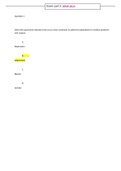
NRNP6635
What is the primary goal of data collection during the psychiatric interview? A. To obtain the family’s perception of the patient’s health and illness B. To explain the provider’s perception of the patient’s health and illness C. To obtain the patient’s perception of their health and illness D. To obtain statistics regarding the patient’s health and illness Select the criteria in DSM-5 to diagnose a child with major depressive disorder. A. At ...
- Exam (elaborations)
- • 51 pages •
What is the primary goal of data collection during the psychiatric interview? A. To obtain the family’s perception of the patient’s health and illness B. To explain the provider’s perception of the patient’s health and illness C. To obtain the patient’s perception of their health and illness D. To obtain statistics regarding the patient’s health and illness Select the criteria in DSM-5 to diagnose a child with major depressive disorder. A. At ...
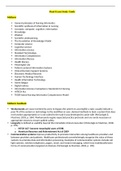
FINAL EXAM STUTY GUIDE
• General principles of Nursing Informatics • Scientific synthesis of information in nursing • Concepts: computer, cognitive, information • Knowledge • Wisdom • Scientific Underpinning • The Foundation of Knowledge Model • Computer science • Cognitive science • Information science • Standard Terminology • Informatics Competencies • Information literacy • Health literacy • Meaningful Use • Patient-centered Information Systems • Clinical Decision S...
- Exam (elaborations)
- • 12 pages •
• General principles of Nursing Informatics • Scientific synthesis of information in nursing • Concepts: computer, cognitive, information • Knowledge • Wisdom • Scientific Underpinning • The Foundation of Knowledge Model • Computer science • Cognitive science • Information science • Standard Terminology • Informatics Competencies • Information literacy • Health literacy • Meaningful Use • Patient-centered Information Systems • Clinical Decision S...
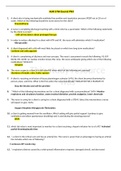
FCCA 274A Exam
1. Which statement by an older adult during the health history indicates the person is at a high risk for falls and needs further evaluation? a. “My spouse’s things clutter my house.” b. “I recently had cataract surgery.” c. “It helps me when I focus on one thing at a time.” d. “I will be 64-years-old this month.” 2. The RN is making a home visit to conduct a health history for a patient who will require assistance in the home following an extensive surgical procedure. A...
- Exam (elaborations)
- • 6 pages •
1. Which statement by an older adult during the health history indicates the person is at a high risk for falls and needs further evaluation? a. “My spouse’s things clutter my house.” b. “I recently had cataract surgery.” c. “It helps me when I focus on one thing at a time.” d. “I will be 64-years-old this month.” 2. The RN is making a home visit to conduct a health history for a patient who will require assistance in the home following an extensive surgical procedure. A...
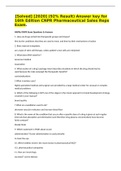
[Solved] [2020] (92% Result) Answer key for 16th Edition CNPR Pharmaceutical Sales Reps Exam.
1. How are drugs sorted into therapeutic groups and classes? first by the conditions that they are used to treat. and then by their mechanisms of action 2. Bone marrow transplants. are a type of stem cell therapy. unless patient's own cells are reinjected. 3. What does AMA stand for? American Medical Association 4. What section of a drug's package insert describes situations in which the drug should not be used because the risks outweigh the therapeutic benefits? contraindications 5 Wha...
- Exam (elaborations)
- • 13 pages •
1. How are drugs sorted into therapeutic groups and classes? first by the conditions that they are used to treat. and then by their mechanisms of action 2. Bone marrow transplants. are a type of stem cell therapy. unless patient's own cells are reinjected. 3. What does AMA stand for? American Medical Association 4. What section of a drug's package insert describes situations in which the drug should not be used because the risks outweigh the therapeutic benefits? contraindications 5 Wha...
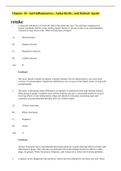
Anti-inflammatory, Antiarthritis, and Related Agents
1. A 45-year-old male patient with suspected acromegaly is seen at the clinic. To assist in making the diagnosis, which question should the nurse ask? a. Have you had a recent head injury? b. Do you have to wear larger shoes now? c. Is there a family history of acromegaly? d. Are you experiencing tremors or anxiety? ANS: B Acromegaly causes an enlargement of the hands and feet. Head injury and family history are not risk factors for acromegaly. Tremors and anxiety are not clini...
- Exam (elaborations)
- • 16 pages •
1. A 45-year-old male patient with suspected acromegaly is seen at the clinic. To assist in making the diagnosis, which question should the nurse ask? a. Have you had a recent head injury? b. Do you have to wear larger shoes now? c. Is there a family history of acromegaly? d. Are you experiencing tremors or anxiety? ANS: B Acromegaly causes an enlargement of the hands and feet. Head injury and family history are not risk factors for acromegaly. Tremors and anxiety are not clini...
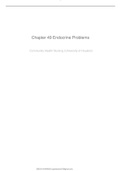
Endocrine Problems
1. A 45-year-old male patient with suspected acromegaly is seen at the clinic. To assist in making the diagnosis, which question should the nurse ask? a. Have you had a recent head injury? b. Do you have to wear larger shoes now? c. Is there a family history of acromegaly? d. Are you experiencing tremors or anxiety? ANS: B Acromegaly causes an enlargement of the hands and feet. Head injury and family history are not risk factors for acromegaly. Tremors and anxiety are not clini...
- Exam (elaborations)
- • 21 pages •
1. A 45-year-old male patient with suspected acromegaly is seen at the clinic. To assist in making the diagnosis, which question should the nurse ask? a. Have you had a recent head injury? b. Do you have to wear larger shoes now? c. Is there a family history of acromegaly? d. Are you experiencing tremors or anxiety? ANS: B Acromegaly causes an enlargement of the hands and feet. Head injury and family history are not risk factors for acromegaly. Tremors and anxiety are not clini...
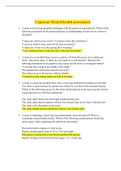
Capstone Mental health assessment
1. A nurse is discussing discipline techniques with the parent of a preschooler. Which of the following statements by the parent indicates an understanding of time-out as a form of discipline? "I place my child in time-out for 15 minutes when they misbehave." "I send my child to their room for the time-out period." "I make use of time-out after giving three warnings." "I use a kitchen timer to mark the end of the time-out period." 2. A nurse in a well-child clinic receives a phon...
- Exam (elaborations)
- • 11 pages •
1. A nurse is discussing discipline techniques with the parent of a preschooler. Which of the following statements by the parent indicates an understanding of time-out as a form of discipline? "I place my child in time-out for 15 minutes when they misbehave." "I send my child to their room for the time-out period." "I make use of time-out after giving three warnings." "I use a kitchen timer to mark the end of the time-out period." 2. A nurse in a well-child clinic receives a phon...
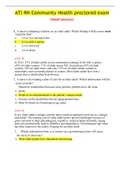
ATI RN Community Health proctored exam 2020
1. A nurse is obtaining a history on an older adult. Which finding will the nurse most typically find? a. Lives in a nursing home b. Lives with a spouse c. Lives divorced d. Lives alone ANS: B In 2012, 57% of older adults in non-institutional settings lived with a spouse (45% of older women, 71% of older men); 28% lived alone (35% of older women, 19% of older men); and only 3.5% of all older adults resided in institutions such as nursing homes or centers. Most older adults have lost a sp...
- Exam (elaborations)
- • 24 pages •
1. A nurse is obtaining a history on an older adult. Which finding will the nurse most typically find? a. Lives in a nursing home b. Lives with a spouse c. Lives divorced d. Lives alone ANS: B In 2012, 57% of older adults in non-institutional settings lived with a spouse (45% of older women, 71% of older men); 28% lived alone (35% of older women, 19% of older men); and only 3.5% of all older adults resided in institutions such as nursing homes or centers. Most older adults have lost a sp...
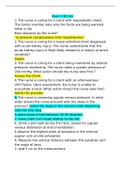
Exam 2 NR 341
1. The nurse is caring for a client with hypovolemic shock. The family member asks why the fluids are being warmed. What is the Best response by the nurse? “to prevent complications from hypothermia” 2. The nurse is caring for a newly admitted client diagnosed with acute kidney injury. The nurse understands that the acute kidney injury is Most likely related to a history of which condition? Sepsis 3. The nurse is caring for a client being monitored by arterial pressure monitoring. The n...
- Exam (elaborations)
- • 11 pages •
1. The nurse is caring for a client with hypovolemic shock. The family member asks why the fluids are being warmed. What is the Best response by the nurse? “to prevent complications from hypothermia” 2. The nurse is caring for a newly admitted client diagnosed with acute kidney injury. The nurse understands that the acute kidney injury is Most likely related to a history of which condition? Sepsis 3. The nurse is caring for a client being monitored by arterial pressure monitoring. The n...
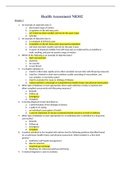
Health Assessment NR302
Chapter 1 1. An example of subjective data is: a. Decreased range of motion b. Crepitation in the left knee joint c. Lef t knee has been swollen and hot for the past 3 days d. Arthritis 2. An example of objective data is: a. A complaint of left knee pain b. Crepitation in the lef t knee joint (assessed by palpation) c. Left knee has been swollen and hot for the past 3 days d. A report of impaired mobility from left knee pain as evidenced by an inability to walk, swelling, and pain on...
- Exam (elaborations)
- • 13 pages •
Chapter 1 1. An example of subjective data is: a. Decreased range of motion b. Crepitation in the left knee joint c. Lef t knee has been swollen and hot for the past 3 days d. Arthritis 2. An example of objective data is: a. A complaint of left knee pain b. Crepitation in the lef t knee joint (assessed by palpation) c. Left knee has been swollen and hot for the past 3 days d. A report of impaired mobility from left knee pain as evidenced by an inability to walk, swelling, and pain on...

ATI FUNDAMENTALS MID TERM EXAM Questions 2021
ATI LPN COMPREHENSIVE PREDICTOR –CORRECTLY UPDATED STUDY GUIDE 2021
ATI DOSAGE CALCULATIONS – 100% CORRECT SOLUTION GUIDE
566 Midterm Study Guide 2021
ATI RN PEDS PROCTORED EXAM 2020/2021-STUDY GUIDE